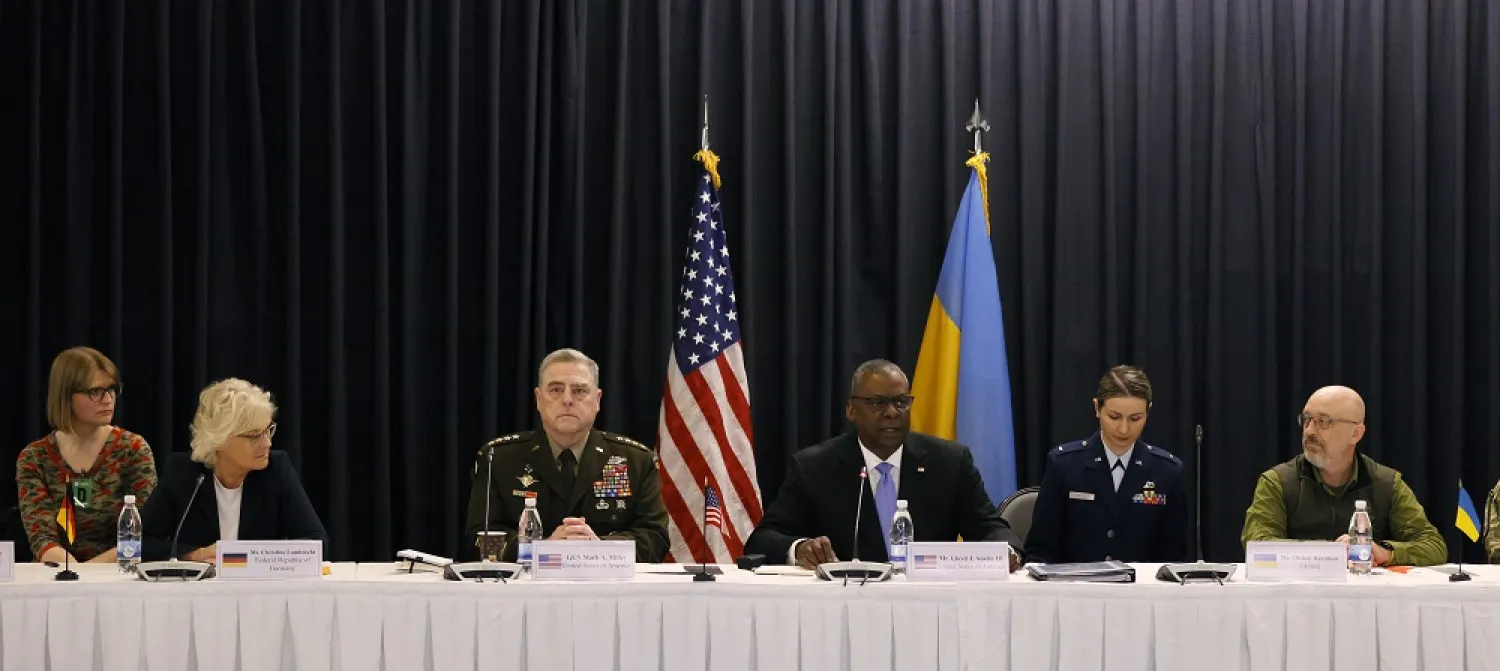The United States said the world was galvanized against Russia's two-month-old invasion of Ukraine as it hosted defense talks in Germany involving over 40 countries that sought to speed and synchronize the delivery of arms to Kyiv.
US Defense Secretary Lloyd Austin hosted the event at Ramstein Air Base following a trip to Kyiv where he pledged additional military support to Ukrainian President Volodymyr Zelenskiy's war effort, which is at a crossroads.
"As we see this morning, nations from around the world stand united in our resolve to support Ukraine in its fight against Russia's imperial aggression," Austin said at the start of talks.
"Ukraine clearly believes that it can win, and so does everyone here."
US Army General Mark Milley, chairman of the Joint Chiefs of Staff, cautioned that Ukraine needed more security assistance to help it defend against an unfolding and potentially decisive Russian onslaught in the east. He said the coming weeks were "critical."
"Time is not on Ukraine's side," Milley said during closed-door remarks provided to reporters traveling with him. "The outcome of this battle, right here, today, is dependent on the people in this room."
Milley added: "The Ukrainians will fight. We need to make sure they have the means to fight."
Driven back by Ukrainian forces from a failed assault on Kyiv in the north, Moscow has redeployed troops into the east for a ground offensive in two provinces known as the Donbas.
US officials, speaking on condition of anonymity, assess that Russia will rely heavily on artillery strikes, trying to pound Ukrainian positions as Moscow moves in ground forces from several directions to try to envelop and wipe out a significant chunk of Ukraine's military.
But the United States also estimates many Russian units are depleted, with some operating with personnel losses as high as 30% -- a level considered by the U.S. military to be too high to keep fighting, officials say.
US officials cite anecdotes like Russian tanks with sole drivers and no crew and substandard equipment that is either prone to breakdowns or out of date.
British assessments showed that about 15,000 Russian personnel had been killed in the conflict while 2,000 armored vehicles including some 530 tanks had been destroyed, along with 60 helicopters and fighter jets, Defense Secretary Ben Wallace said on Monday.
Russia has so far acknowledged only 1,351 troops killed and 3,825 wounded.
Russia still has advanced capabilities and superior force numbers, and has shown a willingness to keep pouring soldiers and units into the fight, U.S. officials said.
Moscow can also economically afford to wage a long war in Ukraine despite being hammered by Western sanctions, defense experts and economists said.
For its part, Ukraine boasts high morale, creative and adaptive battlefield tactics and local knowledge of the terrain, along with arms and intelligence from the United States and its allies.
"They definitely stand a fighting chance," a US military official said, speaking on condition of anonymity.
The meeting is taking place at Ramstein, a sprawling air base southwest of Frankfurt which only months ago was grappling with an influx of Afghan evacuees after the Taliban takeover of that country last summer.
Organizers said over 40 countries were attending and a scan of the meeting room showed countries mainly from Europe but also beyond, including Israel, Kenya and Australia. On a screen, representatives from South Korea and Japan attended virtually.
"This gathering reflects the galvanized world," Austin said.
After the meeting, Austin said in a press conference that the forum would continue as a monthly "contact group" that would discuss Ukraine's defense needs.
Germany, for the first time, announced the delivery of heavy weapons to Ukraine. "We decided yesterday that Germany will facilitate the delivery of Gepard self-propelled anti-aircraft guns to Ukraine," German Defense Minister Christine Lambrecht said at Ramstein, according to the script of her speech.
Russia's Feb. 24 invasion of Ukraine has killed thousands of people, displaced millions more and raised fears of a wider confrontation between Russia and the United States - by far the world's two biggest nuclear powers.
Putin says the "special military operation" in Ukraine is necessary because the United States was using Ukraine to threaten Russia and Ukraine was guilty of the genocide of Russian-speaking people.
Ukraine says it is fighting a land grab by Russia and that Putin's accusations of genocide are nonsense.









